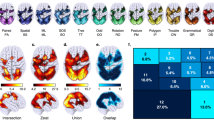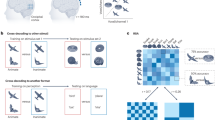Abstract
A RELATIONSHIP between intelligence and the evoked responses of the visual pathway has been demonstrated by a new approach to problems in psychology and psychiatry—the use of electronic instruments. These include various types of average response computers, which are designed to average statistically a number of waveforms so that any random variations in the waveforms are minimized. This statistical averaging makes it possible to study signals which would not otherwise be available because of excessive background noise.
This is a preview of subscription content, access via your institution
Access options
Subscribe to this journal
Receive 51 print issues and online access
$199.00 per year
only $3.90 per issue
Buy this article
- Purchase on Springer Link
- Instant access to full article PDF
Prices may be subject to local taxes which are calculated during checkout
Similar content being viewed by others
References
Bennett, W. F., Psychological Test Method and Means, British Provisional Specification No. 33284/65, August 4, 1965.
Freeman, W. J., Exp. Neurology, 20, 475.
Hodgkin, A. L., and Huxley, A. F., J. Physiol., 117, 500 (1952).
Author information
Authors and Affiliations
Rights and permissions
About this article
Cite this article
BENNETT, W. Human Perception: a Network Theory Approach. Nature 220, 1147–1148 (1968). https://doi.org/10.1038/2201147a0
Received:
Revised:
Issue Date:
DOI: https://doi.org/10.1038/2201147a0
This article is cited by
-
IQ Evoked Responses and Fourier Analysis
Nature (1973)
-
The Fourier Transform of Evoked Responses
Nature (1972)
-
Fourier Analysis of Evoked Potentials and Human Intelligence
Nature (1971)
Comments
By submitting a comment you agree to abide by our Terms and Community Guidelines. If you find something abusive or that does not comply with our terms or guidelines please flag it as inappropriate.



